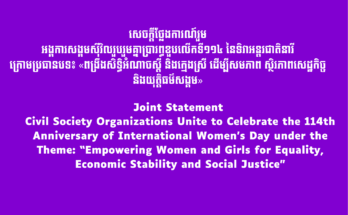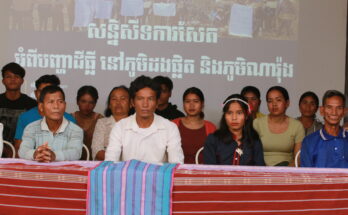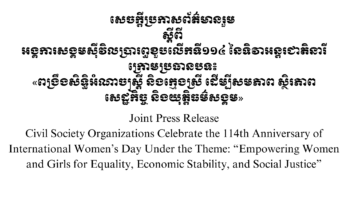Working together for Natural Resource Government and the Implementation of the National Strategic Development Plan:
On the 22nd-23rd of November 2011 ADHOC co-organized the 6th National Advocacy Conference, which this year was on the topic of “Working together for Natural Resource Government and the Implementation of the National Strategic Development Plan”. The conference was meant as to act as a forum for community representatives and civil society to raise their concerns and come up with ways to improve the advocacy work in this area. More than 330 representatives from Phnom Penh and 18 different provinces as well as national and international civil society organizations participated actively in the conference, which resulted in the drafting of a joint statement containing a series of recommendations to the Royal Government of Cambodia.
The common denominator among all community representatives who attended the conference was that they were all personally affected by land disputes in their home provinces. Land disputes often have a grave impact on individuals’ livelihoods and many of the representatives came to the conference eager to tell their stories and hand over documentation to the government and civil society. They were given the opportunity to do so as the conference was also attended by several government officials including representatives from the Ministry of Land Management, Urban Planning and Construction and the Ministry of Economy and Finance. Also, Deputy President of the Court of Appeal, Seng Sivutha, spoke at the conference addressing the legality of land concessions and the different complaint mechanisms in place. Victims found it especially difficult to believe that forced evictions and lack of compensation could be in accordance with the law and asked Seng Sivutha many critical questions. In an article published in the Cambodia Daily on the 23rd of November the head of Monitoring Section of ADHOC, Ny Chakrya, elaborated on this, highlighting the key role that courts play in land disputes when they ignore clear violations of the law and people’s rights: “Disputes between people and the state or a private company are complicated, but when courts don’t respond to complaints, it is a clear violation when a company dismantles people’s property”.
After two days of presentations, workshops and much constructive debate on the topic, a joint statement was presented at a press conference on the last day of the conference. In the statement, the participants expressed their main concerns and gave a number of recommendations to the National Assembly and the Royal Government as well as private companies and international partners for future improvement. The concerns and recommendations fell within the areas of Land Issues, Hydropower dams, Forestry and Indigenous people and Social, Economic and Mining Concessions. Common to all areas were the issues of forced evictions and the challenges faced by affected communities, the special challenges faced by indigenous people when trying to preserve their culture, the lack of consultation with the public, improper Environmental and Social Impact Assessment, non-compliance with the relevant legislation and the misuse of the judicial system in relation to arrest and imprisonment of land activists (an English version of the full statement will shortly be made available on ADHOC’s website).
At the end of the two-day conference the community representatives went home to their provinces and the civil society representatives back to their offices, all with a renewed eagerness to continue their work advocating for fair governance of natural resources and the implementation of the National Strategic Development Plan.



